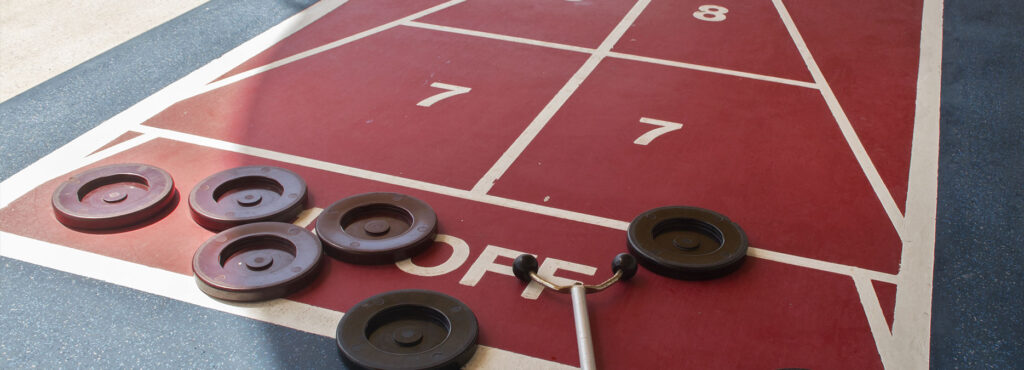Shuffleboard is a unique and cool game that brings lots of excitement to you, your family and friends. It doesn’t require much energy for those who may be afraid to even try it! It burns almost the same number of calories while walking slowly. It is a game dated back for more than 500 years. The game is played by pushing pucks along a narrow path. There are two types of shuffleboard. They are table shuffleboard and deck shuffleboard. Table shuffleboard is commonly described as indoor shuffleboard while deck shuffleboard is also known as having an outdoor shuffleboard court. The goal of table shuffleboard is the same as deck shuffleboard.
SIZE OF THE COURT
Despite the fact that there is an official standard outdoor shuffleboard court, dimensions of a shuffleboard court can easily vary to suit available space. The official outdoor shuffleboard court is 6 feet wide by 39 feet in length plus a 6-foot shooting area at each end. According to the standard, each scoring zone is an isosceles triangle with the dimensions of 6 feet × 9 feet.
Table shuffleboard: Table shuffleboard exists in different sizes which run from 9 feet to 22 feet in length. Generally, a table can be constructed in 2 feet increments or decrements starting from the standard size of 16 feet. Nevertheless, the size of a room can determine the length of the shuffleboard that it will occupy. It is good to consider the width of the board while making a choice for a shuffleboard table. The best width is between 18 and 20 inches with 2-3 inches in thickness. It is always advisable to clear off any obstruction at least two feet behind the edges of the shuffleboard table.
WHAT YOU NEED
To play shuffleboard, the major things that you need are:
Deck Shuffleboard
- Shuffleboard Court
- Eight round, hard, durable 6-inch diameter plastic discs.
- Cue-Sticks: you will use your cue stick to push your disc to the opposite end.
- Scoreboard: there are two types of a scoreboard. A resort type and a whiteboard type. A resort type has the advantage of having no other need for chalk or eraser. It is straightforward and durable. Some prefer a whiteboard type which also has the advantage that scoring mistakes will be easy to determine.
Table Shuffleboard
- Shuffleboard table
- Set of pucks
- Table wax and Spray-on silicon: this makes the surface of the table smooth for the best game experience.
- Scoring Beads: A scoring bead is designed like an abacus. It is a means of scoring in table shuffleboard.
- Bowling Pins: This gives players different options of playing the game.
HOW TO PLAY
Three main objectives are important to consider while learning how to play a shuffleboard game.
- Placement of your puck is crucial. This is a skill that needs constant practice. It is important to place your puck at the far end of the board without it falling out of the large framed triangle at the end of the court.
- Be offensive minded: As you learn how to play shuffleboard, try to knock off your opponent’s highest scoring pucks to prevent them from scoring.
- Be defensive minded. You have to place many of your pucks in front of your highest scoring puck so that your opponent will not be able to knock you off or score.
The first player in shuffleboard slides his first puck to the other end of the board. In like manner, the opponent shoots his own puck with an attempt to knock off the first player puck. It might also be to outdistance the puck from the opponent. The choice depends on the skill and the instinct of the player. Both players continue to shoot their puck in an alternating turn until all the pucks have been shuffled. This makes it a single round. The player whose puck moves furthest down the board is the winner. The game can be played by two people (single) and also by four people (double). The rule that governs the game is that the play must be in an alternating turn.
KEEPING SCORE
Trying to slide a puck into the opponent is not enough, but it has to be with the purpose of scoring. To score a point, the weight must move past the scoring lines. If the weight moves past the second line, then two points is allotted. If it moves past the third line, three points is allotted. The first line gives one point. At the end of each round, the player that has the weight closest to the edge of the board wins the points. For example, if a blue puck is closest to the edge and sits on the three point section and red puck is found at the two point section, the blue player will earn point for the round, and the red player will not earn any points.
GAINING IN POPULARITY
Shuffleboard is gaining popularity because it possess the characteristics of being easy to learn and easy to play. This consistent increase in popularity is also linked to the fact that all categories of ages can play the game. The category ranges from children to adult. Grandparent can play with grandchildren. It provides a great family bonding experience for all and a chance to invite friends over to relax and enjoy a strategic and fun game. Many homes today choose shuffleboard because of its easy accessibility in rooms and backyards.

